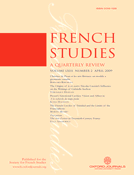
French Studies is published on behalf of the Society for French Studies.The journal publishes articles and reviews spanning all areas of thesubject, including language and linguistics (historical andcontemporary), all periods and aspects of literature in France and theFrench-speaking world, thought and the history of ideas, culturalstudies, film, and critical theory.
Vol. 63, no 2 (avril 2009)
Bernard Ribémont
Christine de Pizan et les arts libéraux: un modèle a géométrie variable
On a souvent souligné l'attrait de Christine pour les sciences, et l'inscription de nombreuses références savantes dans son discours didactique a été étudiée à l'occasion de différents travaux. L'interprétation la plus courante de ce procédé ressortit à l'affirmation d'autorité de Christine. Le présent travail se propose de reconsidérer cette question, à l'aune de la façon dont Christine utilise la référence aux arts libéraux. On tentera de montrer que le système christinien est instable en la matière et inscrit, de fait, une profonde tension dans le didactisme christinien.
Véronique Desnain
The Origins of la vie neutre: Nicolas Caussin's Influence on the Writings of Gabrielle Suchon
This article examines the influence of Nicolas Caussin's writing on secular celibacy (vie neutre) — and especially of his Vie de Sainte Isabelle (1643) — on Gabrielle Suchon's Traité de la morale et de la politique (1693) and Du célibat volontaire, ou la vie sans engagement (1700). I argue that this overlooked source played a considerable part in shaping Suchon's theories regarding the subordination of women and the usefulness of a celibate life in the secular world. In order to establish this source's importance, Caussin's influence is considered in relation to Suchon's other known sources as well as in the context of the Querelle des femmes. The similarities between the two authors' works are considered in terms of vocabulary, rhetorical issues and theological positions in order to prove that Suchon uses a number of ideas originally found in Caussin as a springboard for a far more extensive and complex argument. Unlike him, she does not take the notion of secular celibacy for granted but examines the obstacles put in the way of those who would choose it (especially women), analyses dominant discourse on the place of women in society and offers counterarguments and practical advice for potential neutralistes.
Katja Haustein
Proust's Emotional Cavities: Vision and Affect in A la recherche du temps perdu
Against the background of the ‘waning of affect' in modern times1 and the (post-)Freudian consignment of feelings to theories of drives, the ineluctable question emerges of where we can satisfactorily place emotionality at all nowadays. What role do feelings play in works of art? This article reflects on these questions by examining the relationship between vision (both bodily and photographic) and affect in Proust's A la recherche du temps perdu. Reading Proust's work as part of a growing tendency to hollow out the Romantic idea of emotion, the article explores the advancing displacement of ‘holistic emotionality' by the rapid increase in ‘emotional cavities'. These are zones devoid of any emotional contact or correspondence between the narrator and the world he perceives. In close readings of the scenes connected with the death of the grandmother and of Albertine sleeping, this article argues that Proust introduces a new understanding of affect that neither theorizes it as essential and all-pervading nor simply disqualifies it in a modernist gesture of denial. Instead, Proust's work proposes a conception of affect that eventually appears as privatized, contingent and in peril.
Martin Munro
The French Creoles of Trinidad and the Limits of the Francophone
This article is framed by the argument that, for all its justified condemnation of the closed nature of traditional French studies, the realm of Francophone studies constructs its own barriers and its own conventions of what constitutes Francophone writing. The influence of postcolonial theory on the field, it is argued, has focused interest almost exclusively on the literature of the colonized and the repressed in neocolonial and postcolonial situations. The influence of conventional French studies has, moreover, led most Francophone scholars to work on areas where France and French language retain an important presence. While not denying the necessity of this dual focus, the article proposes that attention be paid to areas where French colonial presence was interrupted or subsumed by that of another colonial power. The body of the article considers the history and cultural legacy of the French Creoles of Trinidad as an example of a Francophone group that wielded considerable influence in the nineteenth century, but which has now all but disappeared. The analysis leads to the conclusion that the study of such forgotten pockets of Francophone literature is one way of ensuring a creative discordance within the realm of Francophone studies.